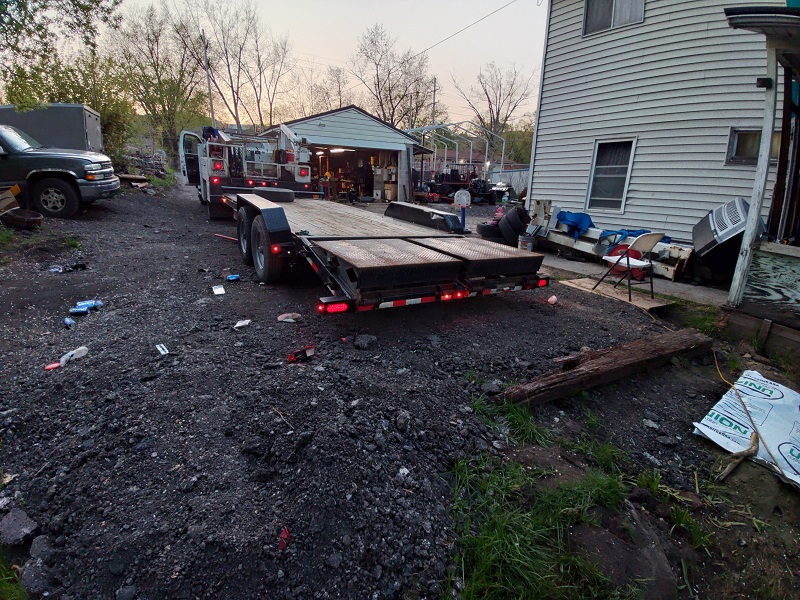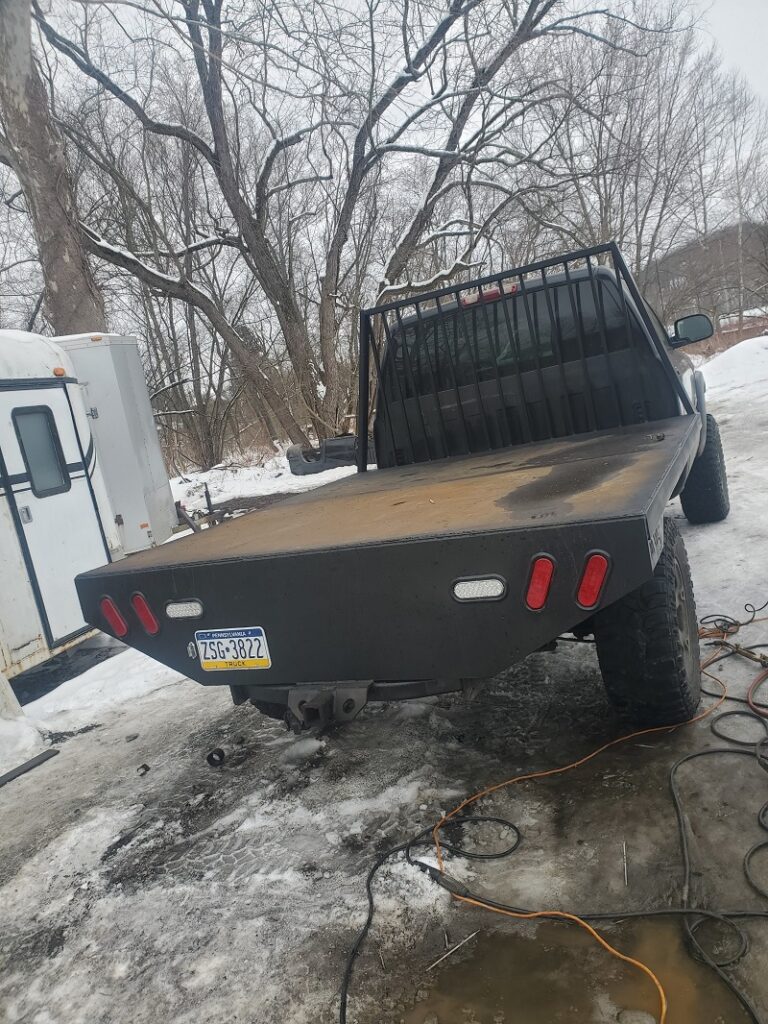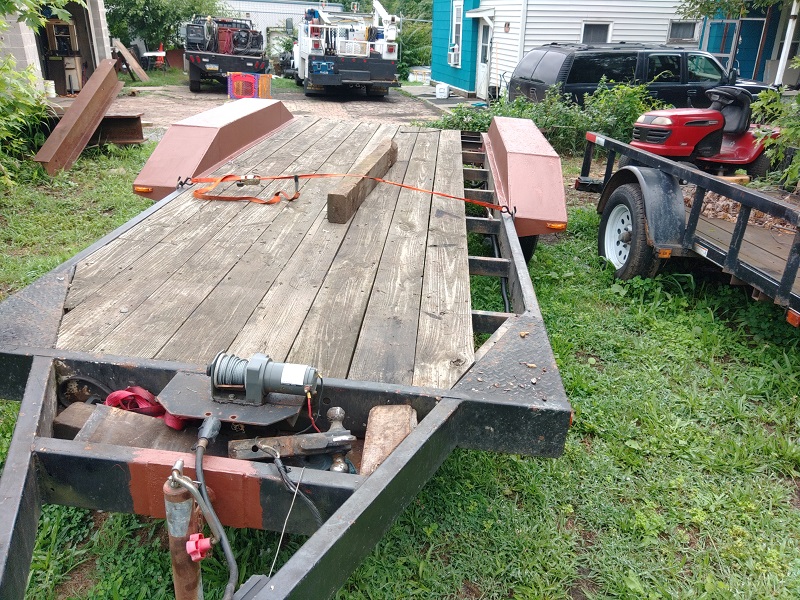Welding and fabricating are essential skills in trailer repair, as trailers, whether for cargo, livestock, or other purposes, can experience significant wear and tear over time. Welding and fabrication play a crucial role in restoring damaged trailers to their functional and safe condition. Here’s how welding and fabricating are involved in trailer repair:
1. Assessment and Diagnosis:
- Skilled technicians assess the trailer’s condition to identify areas that need repair or replacement.
- Common issues include frame damage, rusted components, cracked welds, damaged panels, and structural weaknesses.
2. Welding Techniques:
- Welding processes such as arc welding, MIG welding, and TIG welding are used to repair or replace damaged or worn-out metal components.
- Welding may involve rejoining broken parts, reinforcing weak points, and repairing structural damage.
3. Frame Repair and Alignment:
- Trailer frames can suffer damage from accidents, heavy loads, and exposure to the elements. Welding is used to repair frame cracks and ensure proper alignment.
- Frame alignment is critical for the stability and safety of the trailer.
4. Panel Repair and Replacement:
- Welding is used to repair or replace damaged body panels, such as sides, doors, roofs, and floors.
- Fabricating new panels may be necessary in cases of extensive damage.
5. Component Repair:
- Welding and fabrication are used to repair various trailer components, including hitch assemblies, axles, suspension systems, and mounting brackets.
6. Custom Fabrication:
- In cases where original parts are no longer available, fabricators create custom parts that match the trailer’s specifications.
- This can include fabricating unique brackets, reinforcements, or specialized accessories.
7. Safety Considerations:
- Safety is a top priority in trailer repair. Welding and fabrication require proper ventilation, protective gear, and adherence to safety protocols.
8. Weld Inspection:
- Welds are inspected to ensure quality and adherence to industry standards. Non-destructive testing methods may be employed to detect defects.
9. Finishing and Protection:
- After welding, finishing processes like grinding, painting, or coating are applied to protect repaired areas from corrosion.
10. Testing and Validation: – Repaired trailers undergo testing to ensure they meet safety standards and perform as expected.
11. Documentation: – Comprehensive documentation of the repair process, materials used, welding procedures, and testing results is important for record-keeping and compliance.
Here are some of the benefits of using welding to repair trailers:
- Welding is a strong and durable way to join metal parts together.
- Welding can be used to repair a wide range of trailer damage.
- Welding is a relatively quick and efficient way to repair trailers.
- Welding can be used to make trailers stronger and more durable.
Here are some of the challenges of using welding to repair trailers:
- Welding requires the expertise of a qualified welder.
- Welding can be a dangerous process if not done properly.
- Welding can produce fumes and other pollutants that can be harmful to the environment.
Overall, welding is a versatile and effective way to repair trailer damage. However, it is important to use a qualified welder and to take the necessary safety precautions when welding.
Here are some of the most common welding methods used for trailer repair:
- Arc welding: Arc welding is a process that uses an electric arc to melt the metal parts together. This is the most common welding method used for trailer repair.
- Gas welding: Gas welding uses a gas flame to heat the metal parts and then a filler rod is used to join the parts together. This method is often used for repairs that require a lot of flexibility.
- Resistance welding: Resistance welding uses heat from the resistance of the metal parts to melt them together. This method is often used for repairs that require a lot of speed and efficiency.
The best welding method for a particular trailer repair will depend on the type of damage, the materials being repaired, and the desired results.
Here are some of the safety precautions that should be taken when welding trailers:
- Wear appropriate personal protective equipment (PPE), such as a welding helmet, gloves, and goggles.
- Work in a well-ventilated area to avoid breathing in fumes.
- Use the correct welding method and materials for the job.
- Follow the manufacturer’s instructions for the trailer being repaired.
By following these safety precautions, you can help to prevent injuries and damage to trailers when welding.
Here are some of the common welding repairs done on trailers:
- Frame repair: The frame is the main structural component of a trailer. It is made of metal and supports the weight of the trailer and its load. Frame repair is often necessary to fix cracks, holes, or other damage to the frame.
- Body repair: The body of a trailer is the outer shell that protects the contents of the trailer. It is made of metal or plastic and can be damaged in a collision or by rust. Body repair is often necessary to fix dents, creases, or other damage to the body.
- Axle repair: The axles are the components that support the wheels of the trailer. They are made of metal and can be damaged by wear and tear or by abuse. Axle repair is often necessary to fix problems such as a bent axle or a broken bearing.
- Brake repair: The brakes are responsible for stopping the trailer. They are made of metal and can be damaged by wear and tear or by abuse. Brake repair is often necessary to fix problems such as a spongy brake pedal or a grinding noise when braking.
- Electrical repair: The electrical system of a trailer is responsible for powering the lights, brakes, and other components. It can be damaged by wear and tear or by an accident. Electrical repair is often necessary to fix problems such as a blown fuse or a short circuit.
Trailer repair involves a combination of mechanical expertise, welding skills, and fabrication capabilities. Properly repaired trailers are crucial for safe transportation, whether for commercial or recreational use. Skilled technicians work to restore the trailer’s structural integrity, functionality, and appearance while ensuring the safety of both the trailer and its occupants.




